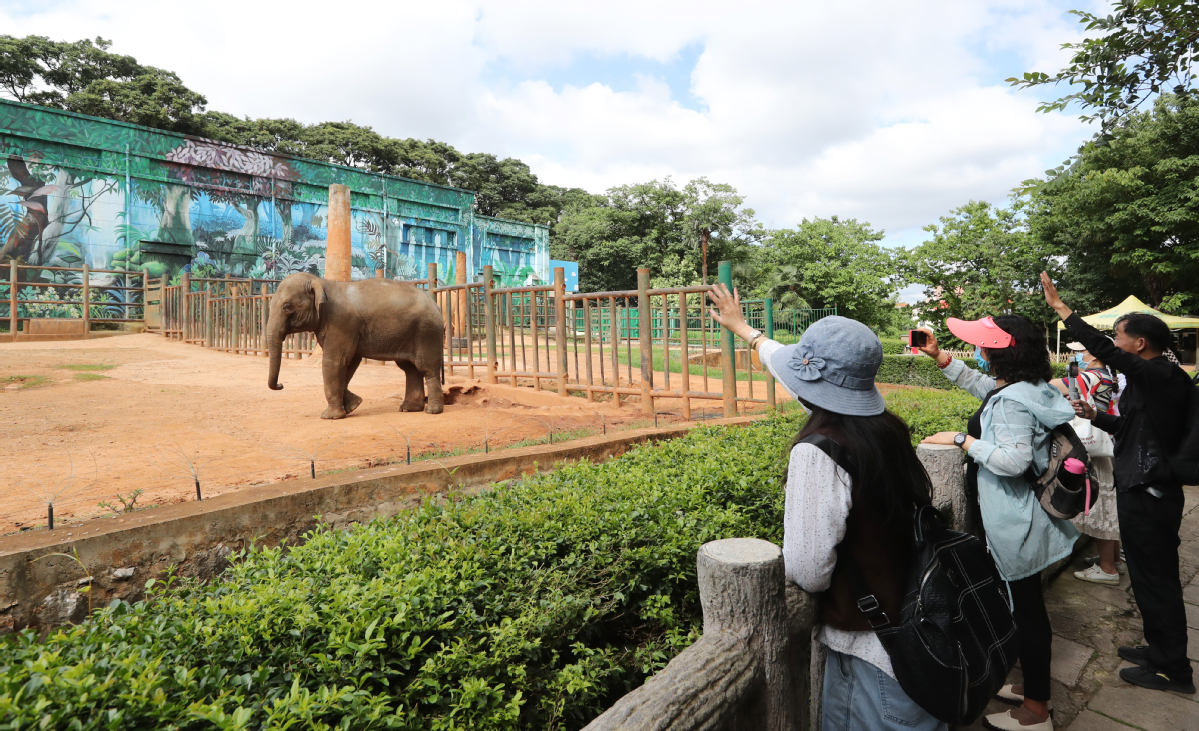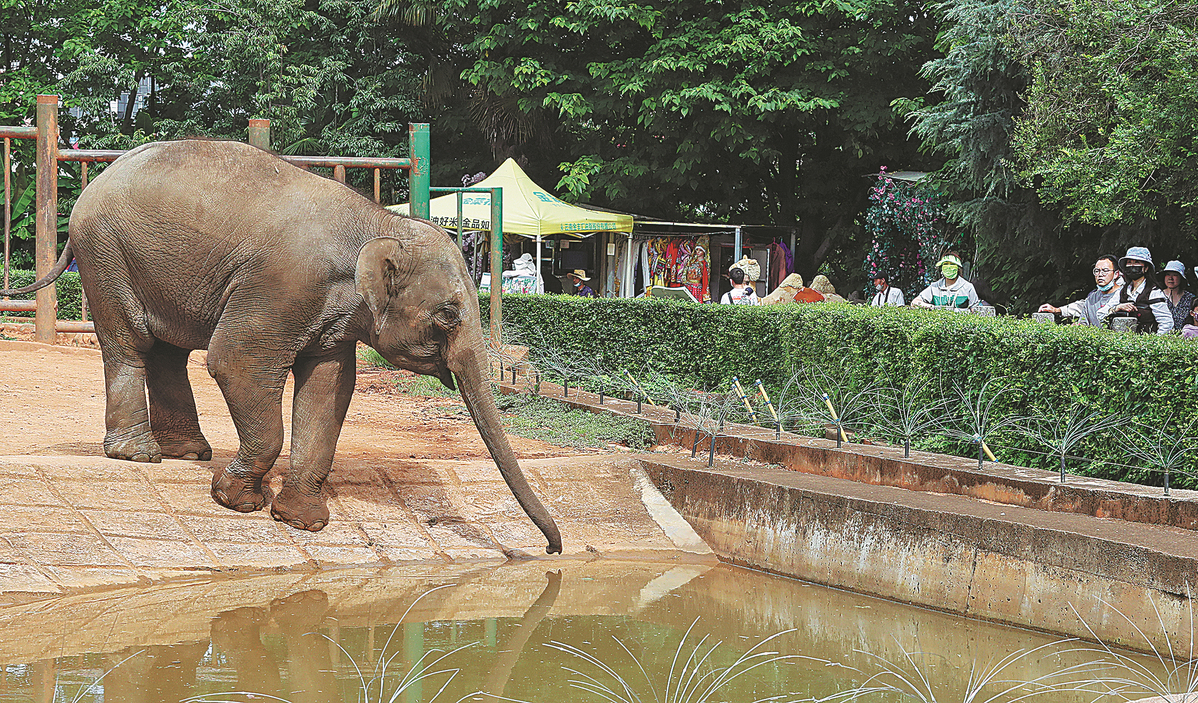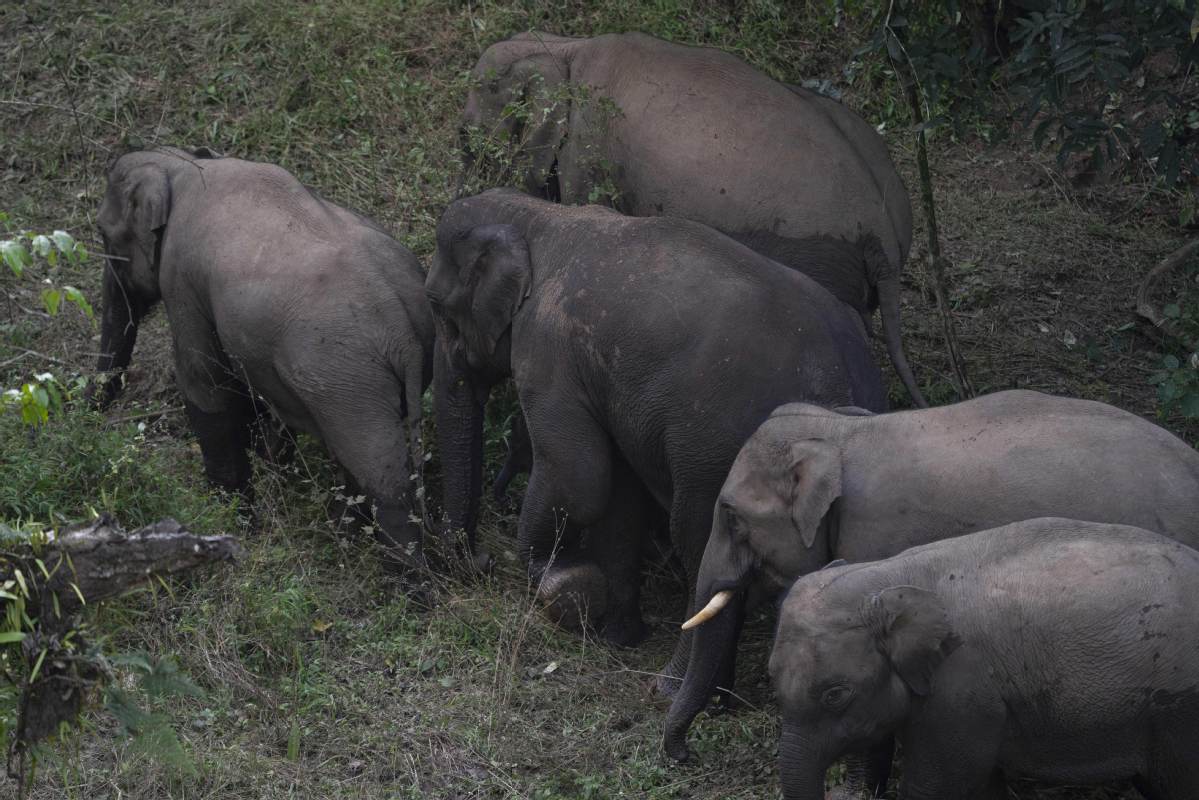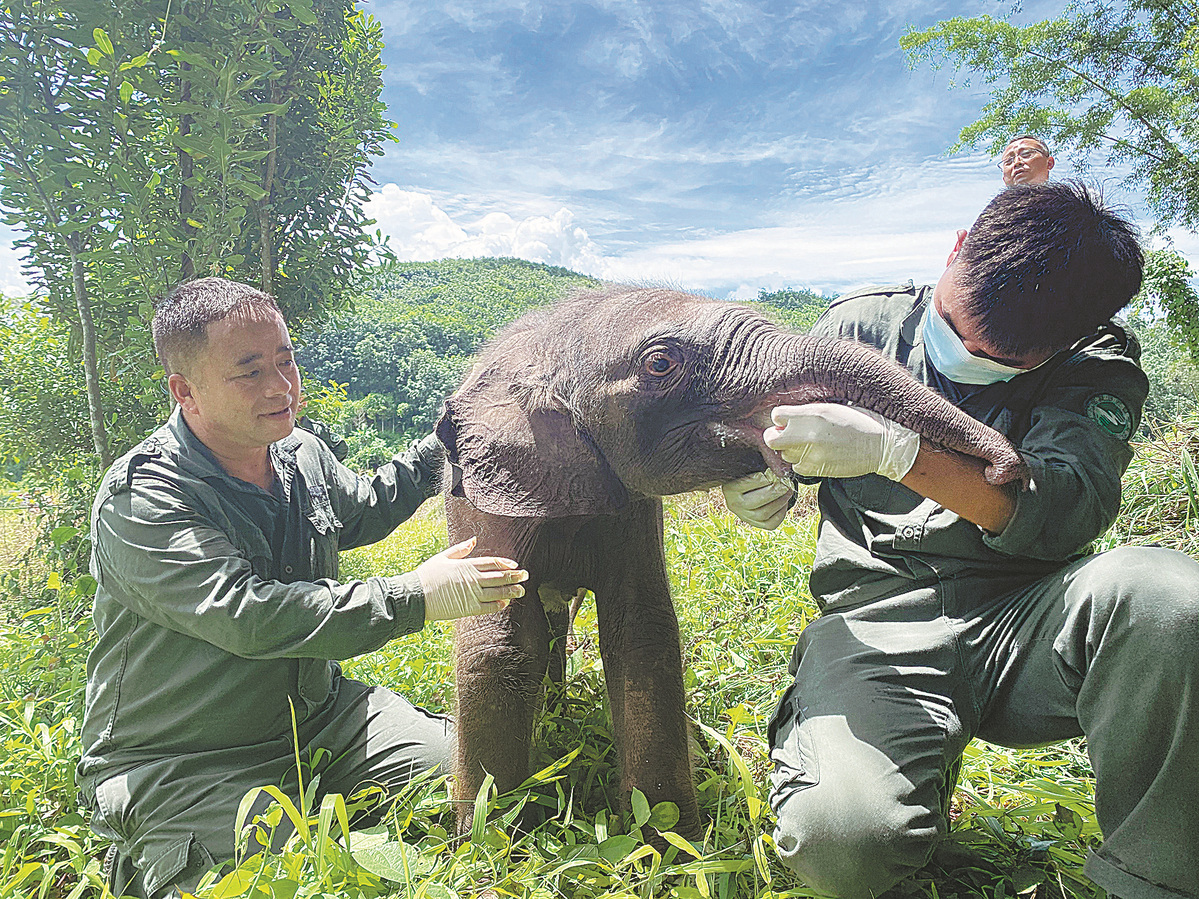The Asian Elephant Molly's successful return to Kunming Zoo, Yunnan with the concerted efforts both at home and abroad, perfectly embodies the Ecological Civilization in a new era.
China Biodiversity Conservation and Green Development Foundation (CBCGDF), as a national-level society in the field of biodiversity in China, has been striving to mainstream biodiversity in trying to save Molly. "The participation of the public is vital to Molly's comeback. " Dr. Zhou Jinfeng, Secretary-General of CBCGDF said.
Here is a report "Successful elephant return shows growing opposition to mistreatment of animals" from China Daily for you to learn the detailed story of Molly.
Successful elephant return shows growing opposition to mistreatment of animals
By Jiang Chenglong | CHINA DAILY | Updated: 2022-08-09 09:22

Female calf travels back to her hometown following social media campaign by thousands of concerned netizens and well-known figures from the world of entertainment. Jiang Chenglong reports.
A famous Asian elephant calf in Southwest China will never know that tens of millions of people nationwide spoke up for her, leading to her return to her hometown 1,600 kilometers from zoos where netizens suspected she was being abused.
The female calf was born in 2016 at Kunming Zoo in the capital of Yunnan province. She was reportedly the first of the third generation of Asian elephants born and bred in China's zoos. As such, she quickly attracted attention. Local TV stations conducted a livestream of her 100th-day party, which was attended by more than 500 primary school students.
On her first birthday, the calf was officially named Moli-pronounced the same as the Mandarin word for jasmine flower-reflecting people's best wishes for her, according to ThePaper.cn, an online news portal.
A report on China Central Television said Moli was served a huge "cake" consisting of various fruits, while hundreds of children surrounded her enclosure and sang Happy Birthday. Moli's keepers said they would hold birthday parties for her every year.
However, Moli didn't enjoy a second birthday party at the zoo-instead, she experienced many twists and turns in the years that followed.
Kunming Zoo's official social media account said Moli was weaned and one of her feet was chained to a stake.
In spring 2018, the then 2-year-old was transferred to a zoo in Qinyang, a city in the central province of Henan, in exchange for another Asian elephant. The plan was to mate the older elephant in new surroundings to widen the gene pool in China's zoos.
 Moli adapts to her new environment in June after returning to Kunming Zoo. YANG ZHENG/FOR CHINA DAILY
Moli adapts to her new environment in June after returning to Kunming Zoo. YANG ZHENG/FOR CHINA DAILY
Video evidence
That was probably Moli's last public appearance until August last year, when a number of netizens noticed an emaciated young elephant that often appeared in short videos shot at zoos in the cities of Jiaozuo and Zhoukou in Henan.
The footage, shared on popular short video-sharing platforms such as Douyin and Kuaishou, showed the young female, accompanied by a man holding an ankus, a tool with a hook and a pointed end that is used to force animals to obey commands.
The elephant, whose feet were chained, could be seen performing tricks, including "playing" the mouth organ and doing a headstand, and being ridden by tourists.
The videos quickly went viral on social media because after comparing the footage with earlier videos from Kunming Zoo, some netizens concluded that the elephant was Moli, who they dubbed the "princess of Asian elephants".
Many volunteers and animal protection organizations posted on Weibo, China's Twitter-like platform, asking whether Moli was being abused and forced to perform, and also querying why the elephant, which should have been at Qinyang Zoo, was appearing at other facilities.
In September last year, Kunming Zoo confirmed that the elephant in the videos was indeed Moli, who had been rented out to other zoos for "exhibition purposes", according to local media reports.
Henan's Jiaozuo Forest Zoo rejected all criticism and denied that the animal had been mistreated.
"Indeed, a little elephant has been exhibited at our zoo, but it was healthy and not abused," the zoo said in a September statement, adding that it is common practice to transfer animals to other facilities to "meet tourists' demands".
It also said that chaining elephants' feet during behavioral training and exhibition was not abuse, but in line with industry norms.
However, Zheng Yu, a wildlife project manager at the international nongovernmental organization World Animal Protection, didn't think that was the case. "Most animal performances look easy, but they are usually based on punishment training, including being starved, whipped and intimidated with an ankus, which is obviously abuse," she said.
"The mental and physical health of these animals, who mostly live in confined spaces, can be damaged because they cannot express themselves."
According to China's laws and regulations on the protection of wildlife, Asian elephants enjoy the highest level of State protection, and it is illegal to abuse animals. However, the law doesn't give a specific definition of abuse.
The Jiaozuo zoo's statement failed to convince tens of thousands of netizens. To learn more about the elephant's rental period and the administrative permission for the move, the China Biodiversity Conservation and Green Development Foundation, an NGO, submitted several applications for information disclosure to the zoos at which Moli had stayed, including Kunming Zoo, Jiaozuo Forest Zoo and the zoo in Qinyang.
The only reply came from Kunming Zoo, which refused to disclose the information because it was a "business secret". It told local media that it had "no right" to get Moli back from Qinyang because ownership had passed to the zoo there in accordance with their contract.

Flood of criticism
In the months that followed, a growing number of volunteers and netizens offered to contact the Weibo accounts of celebrities, mainstream media and key opinion leaders to call for greater attention to help Moli return to Kunming.
Eventually, the trickle of constant appeals became a flood of criticism and questions. In April, the biggest-trending Weibo hashtag #SaveElephantMoli received more than 310 million views in just a few days after several celebrities joined the calls to help the young elephant.
One of the best-known figures was Joe Chen, an actor from Taiwan. "Please save the poor little elephant Moli and speak up for her!" Chen wrote in two April 24 posts on her Weibo account, which has more than 70 million followers. "It's really heartbreaking to see the little elephant carrying scars, as she shouldn't be treated like that. Please refuse animal performances and don't abuse animals."
Chen's posts rapidly went viral. The first received nearly 100,000 thumbs-ups and 14,000 comments, and it was forwarded 60,000 times by netizens, including two other celebrities who have about 80 million fans in total on Weibo.
The comments under Chen's post showed people's deep concerns about Moli and other potentially abused wildlife, and urged Qinyang Zoo to send her back to Kunming.
One netizen, @ZhuteZhizhuo, commented with a crying emoji: "Hope more people can focus on the little elephant Moli! Don't harm animals," receiving more than 5,500 thumbs-ups.
A comment from @VeselaXa-vier4ever received nearly 3,000 thumbs-ups, showing people's understanding that Moli's case could have a deep impact on wildlife protection.
"We just want Moli to be free (from Henan) right now," the netizen said, adding that the case would be a "milestone which could promote better development in relations between humans and animals".
Some media also paid great attention to Moli. While conducting interviews at the Qinyang Zoo, Ifeng, the official website of Phoenix TV, came across a delegation from the Henan Forestry Administration that was tasked with investigating Moli's health. The members told Ifeng that Moli's mental state was good and no obvious scars had been discovered.
However, the torrent of criticism and questions remained until May 15, when the Henan Forestry Administration announced that Moli had been sent back to Kunming.
"To respond to public concerns and provide a better growing environment, the Asian elephant Moli at Qinyang Zoo left for Kunming Zoo on May 15," it said in a statement.
People immediately became excited, with the hashtag #MoliSent-BackToKunmingZoo viewed more than 140 million times, ranking high on Weibo's trending list. A netizen from Kunming, @YourFullMoon, commented: "We will see Moli quite often after she returns to Kunming! And we'll expose any problems!"
Late on May 16, Moli arrived at Kunming Zoo, which quickly began a full physical examination and adaptive training. At the end of June, Moli was reunited with her mother in their old enclosure for the first time since 2018, when she left her family, home and normal life.

Timeline
2010: The Ministry of Housing and Urban-Rural Development issues a guideline to further improve zoo management. It also bans all performances by animals.
2014: For the first time, the top forestry and customs authorities publicly destroy all ivory discovered and seized by law enforcement operations. More than 6 metric tons of ivory and ivory products are destroyed in the southern province of Guangdong.
2015: The Changtang Tibetan Antelope and Wild Yak National Park is established in the Tibet autonomous region. It is China's first national park for the conservation of wild animals.
2016: The newly revised Wildlife Protection Law is adopted by the Standing Committee of the National People's Congress, the nation's top legislative body. The law stipulates that abuse of wildlife is strictly prohibited.
2018: A complete ban on the sale and processing of all ivory comes into force on Jan 1.
2019: A center for research on the Asian elephant is established in the southwestern province of Yunnan to offer technological support for future policymaking.
2020: The NPC Standing Committee issues a ruling to completely ban the illegal trade in animals and the consumption of terrestrial wildlife.
2021: The nation's top forestry and agriculture authorities amend the list of 988 kinds of wild animals under the highest level of protection. It is the first time the list has been updated since 1989, and adds 517 more species to the register.
Read More:
Zhou Jinfeng: We want Molly's Whole Family back in the Wild
http://www.cbcgdf.org/English/NewsShow/5007/20058.html

